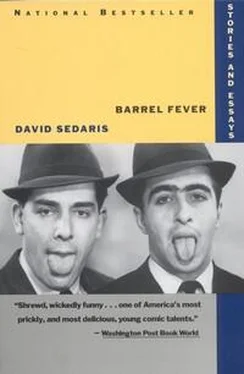I called Gill that night to tell him about it. He must have been expecting a call because he answered it on the first ring. Rather than discuss our difficulties I just plowed into the story as if nothing had ever happened. I talked for maybe two minutes tops before he interrupted me to say, "Dolph, I'm sorry but I really don't want to talk to you when you're drunk."
Drunk? I had, you know, some drinks but I wasn't slobbering or anything. I wasn't singing or asking in a weary voice if I will ever find love. I probably couldn't have passed a Breathalyzer test but what does that matter if you're sitting in your own home? It really ticked me off. How comehe gets to make all the rules? "I'll talk to you when you're sober." So I said, "Yeah, well maybe I'll talk to you when you have red hair and a beard down to your fucking knees."
I had more to say but he hung up before I could complete my thoughts. It bothered the hell out of me, but eventually I came to my senses and realized that sooner or later he's bound to have a relapse. I've read the statistics, and if I know Gill it's just a matter of time before he throws in the towel and starts drinking again. In the meantime I'll just keep my distance.
I had just become comfortable with this prediction when I ran into Gill at a restaurant, and this time I was really drunk. I was at the takeout counter giving my order when I noticed him sitting over a finished meal with three people on the other side of the room. He was wearing a shirt printed with dice, possibly the ugliest shirt I had ever seen on a North American male but still, I was glad to see him. I approached the table and said in a loud voice, "Jesus, Gill, where have you been? Your parole officer has been looking everywhere for you."
Everyone in the restaurant looked up except for Gill, who shook his head and said nothing. Against my better judgment I pulled up a chair and joined their table, introducing myself as an old cellmate from Rikers Island. "Those were the days, weren't they? I think of that bunk bed every day of my life. Remember T-Bone? Remember that guy we all called 'The Rectifier'? Oh, what a time!"
Nobody said anything. Gill rolled his eyes and adjusted the napkin in his lap, which, I assume, sent the "secret coded" message that I was not to be taken seriously. These were the new friends he had met at his meetings, the same type we might have made fun of a few weeks ago. Suddenly, though, they were his people.
A very thin, spent-looking woman with shoulder-length hair gathered in a ponytail cleared her throat and said, "Like I was saying earlier, I thought that Timothy person was very nice. I liked him an awful lot. He's a people person, I could see that right away." This woman was missing one of her front teeth.
Another woman, younger, with heavily moussed blond hair fidgeted with her chopsticks and agreed, saying, "Are you talk-ing about the Timothy with the olive-colored turtleneck and the denim jacket? Oh, I loved that guy. What a nice guy. Was he nice or what?"
"I'd say he's one of the absolute nicest guys I've met in a long time," said the sullen Abe Lincoln look-alike sitting next to me. He paused, scratching at his beard, and small stiff hairs rained onto his empty plate. "I liked Timothy right off the bat because he's just so damned nice how could you not like him?"
"Talk about nice, how about that Chip?" Gill said.
"A chip off the old block," the ugly bearded man said, at which point everyone broke into laughter.
"Ha, ha," I said. "A chip off the old shoulder."
Gill and his companions ignored me until the skinny hag turned to me and said, "You, sir, are standing in the way of our evening and I for one don't appreciate it." I suddenly under-stood why she was missing her front tooth.
Gill said, "Dolph, maybe you should just try to keep quiet and listen for a change." I nodded and leaned back in my chair, thinking, Listen to what? He's so nice, she's so nice, aren't they so nice. Nice is a mystery to me because while on some mundane level I aspire to it, it is the last thing I would want a table full of dullards saying about me.
"Nice job, Byron."
"Hey, Kimberly, nice blouse. Is it new?"
"I love your haircut, Pepper. It's really nice!"
I don't understand nice.Nice is a lazy one-syllable word and it says nothing at all. I prefer to surround myself with more complex words, such asheroic andcommanding.
"That Dolph, is he a national treasure or what?"
I sat at Gill's table for another ten minutes or so during which time I heard the word "nice" twenty-three times until I couldn't stand it anymore. When I finally left, the idiot with the beard called out, "Nice talking to you," which I guess brings the tally up to twenty-four.
I wrote Gill after my mother died, hoping he might pick up the phone and give me a call but instead he chose to mail this hokey calligraphed sympathy card, which I fear he may have actually made himself.
My mother chose to be cremated and the memorial service was sparsely attended just me, three of my four sisters, my mother's boss from the collection agency, and a few of her acquaintances from the firing range.
During that time at our mother's house my sisters were remote and mechanical, acting as though they were hotel maids, tidying up after a stranger. They spoke as if a terrible chapter of their lives had just ended, and I felt alone in my belief that a much more terrible chapter was about to begin. I overheard them gathered together in the kitchen or talking to their husbands on the telephone, saying, "She was a very sad and angry woman and there's nothing more to say about it." Sad? Maybe. Angry? Definitely. But there is always more to say about it. My mother made sure of that.
Three days after the memorial service we met with her lawyer, an energetic woman with very long fingernails painted to resemble American flags. Someone, her manicurist I suppose, spent a great deal of time on the stripes but the stars were a mess, a clot of glitter.
She opened her briefcase and informed us that my mother's house, car, and personal possessions were to be sold at their cur-rent market value. That money would be added to her life insurance, pension plan, and bank holdings and, according to her will, would be donated to her specified charitable organization, The National Rifle Association.
After the initial shock had worn off, my sisters found themselves plenty more to talk about.
I thought it was funny but, then again, I guess I could afford to think of it as funny. On the afternoon of my last visit, after the radiation and chemotherapy had left her with what would soon become pneumonia, my mother handed me a check for forty thousand dollars and warned me to cash it fast. Mrs. Gails's television was blaring a rerun of a vile situation comedy in which a pleasant-looking, vapid teenaged boy acts as the gamekeeper of four terminally precocious children. "Leave," Mom said, pointing to the door. "And on your way out I want you to shut off her television. It'll take the nurses a good twenty minutes to turn it back on. Give me the gift of peace. It's worth the forty thousand dollars, believe me."
As I left the room she offered to double the money if I smothered Mrs. Galls. "Use the pillow," she called. "The pillow."
I didn't mention the money to my sisters as, like my mother, I may be mean but I'm not stupid. The money has allowed me to take my time and relax a little before stumbling into another meaningless job. I really appreciate it and every afternoon when I roll out of bed I look up at the asbestos ceiling and silently thank my mother.
For most of my adult life I've held some sort of a regular daytime job so I'm really not used to being at home during a weekday. With all this time on my hands and neither Gill nor my mother to talk to, I find myself watching a great deal of daytime television and drinking much earlier than usual. It had always been my habit to watch television after returning from work. I knew about detectives, lawyers, police dramas, laugh-track comedies, infomercials, movies both good and bad, pageants, commercials, late-night public relations festivals disguised as talk shows, and the valium of anything presented as educational. So it was with great joy that I entered the world of daytime television. Why, I ask, are these programs broadcast when most people are off at work? Daytime TV is a gold mine of pathological behavior.
Читать дальше












